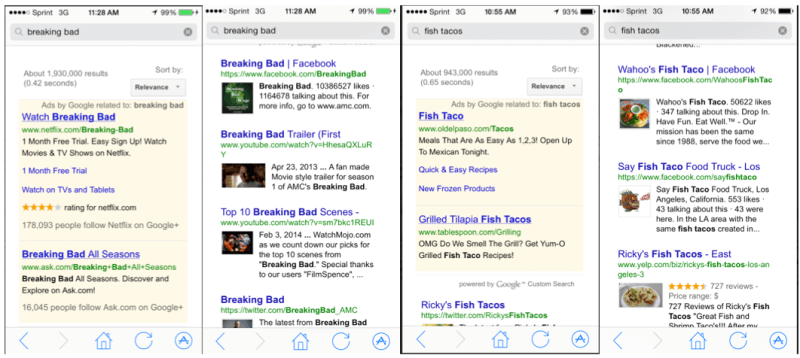In-App Search: Great Idea, Not So Great Experience
Google, Facebook and others are trying to bring the world of internet-style “deep linking” to apps. Google is indexing in-app links from Android in a bid to keep search relevant in a mobile world now dominated by apps. Facebook recently touted gains that its open-source App Link program has made. Now an independent search app […]

Google, Facebook and others are trying to bring the world of internet-style “deep linking” to apps. Google is indexing in-app links from Android in a bid to keep search relevant in a mobile world now dominated by apps. Facebook recently touted gains that its open-source App Link program has made.
Now an independent search app called, appropriately, “In-App Search” is trying to be a search engine for apps. Discussed first by TechCrunch yesterday the app-searching app has indexed “30 searchable apps” on iOS devices.
This is clearly a direction Google is going, with a blend of PC web and in-app links.
In the abstract In-App Search offers users a single place to find all the content on their devices, related to a topic: Ice Bucket Challenge, Ebola, Shakespeare, Breaking Bad, etc. In practice however the app, which admittedly just launched, offers a “so what?” user experience.
Duplicating the look and feel of Google Search results, and using a version of Google Custom Search, In-App Search does an OK job when the topic is general. I can find all the mentions of Breaking Bad or Shakespeare on Twitter, Facebook, Instagram, YouTube, and so on, based on a single search, rather than searching all these apps individually on my iPhone.
I still need to click on links to explore the content. And the overall search experience is not well adapted to smartphones. The presentation of results and the UI need to evolve if this app is to gain more than curious-tech-journalist adoption and testing.
When it comes to location-related searches the app completely fails. While there may be IP targeting, my results didn’t reflect location unless I entered a geomodifier. For example, a search for “Fish Tacos” delivers a range of app-based content from all over the US rather than where I am now (Detroit).
The failure to differentiate the UI and user experience from Google web search is something that will prevent longer term adoption and usage by regular smartphone owners. In addition the gap between using In-App Search and going directly to Yelp or OpenTable or TripAdvisor to look for restaurants is dramatic; the app experience is dramatically better.
The developer might respond that the point of in-app search is greater efficiency so you don’t need to go to each of these apps to execute independent searches. You can see what you’ve got throughout your installed apps and then make a more-informed app selection.
Yet I would argue that In-App Search isn’t really solving a major user problem right now. Most regular people aren’t complaining that they don’t have a way to search the content of all their apps at once.
Hopefully In-App Search will improve. But Google may get there fast enough to pre-empt In-App Search before it can evolve to the point where it stands a chance of broader adoption.
In-App Search is a good idea that has a long way to go before it becomes a useful or viable mobile search engine in practice.
Contributing authors are invited to create content for Search Engine Land and are chosen for their expertise and contribution to the search community. Our contributors work under the oversight of the editorial staff and contributions are checked for quality and relevance to our readers. The opinions they express are their own.
Related stories
New on Search Engine Land
